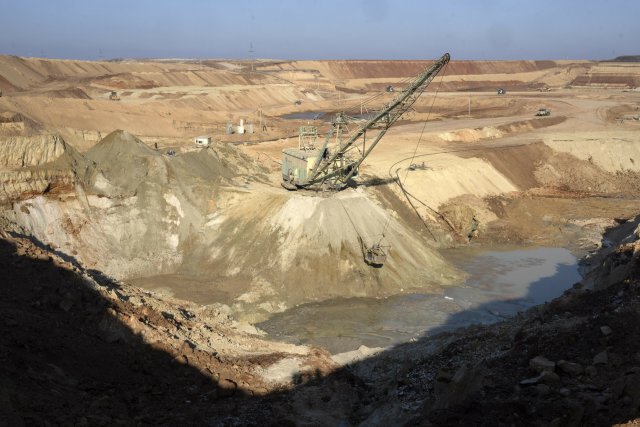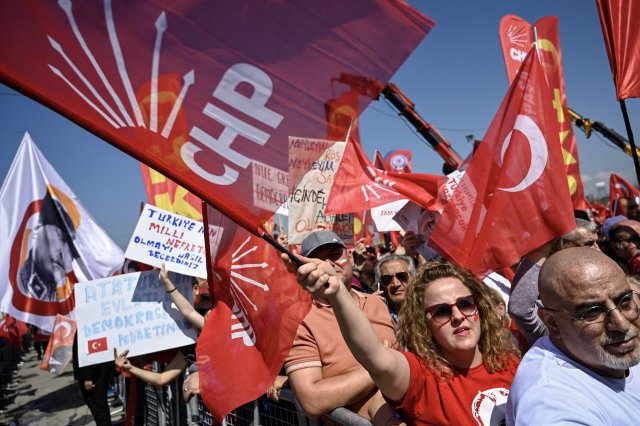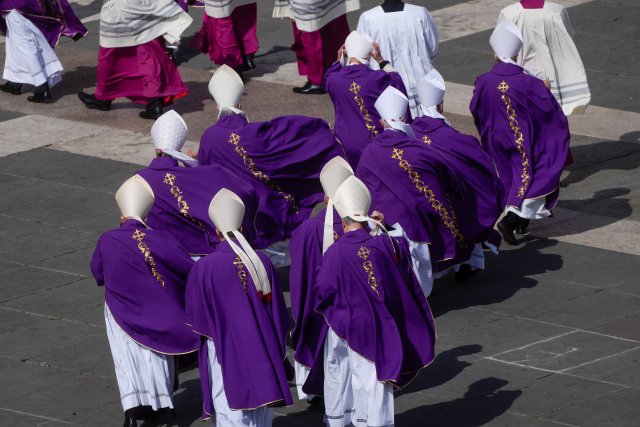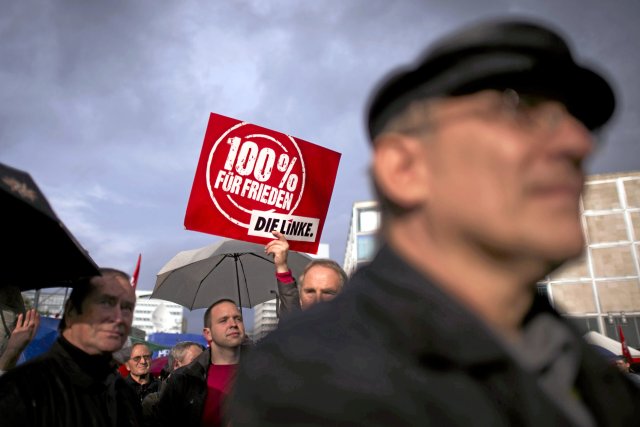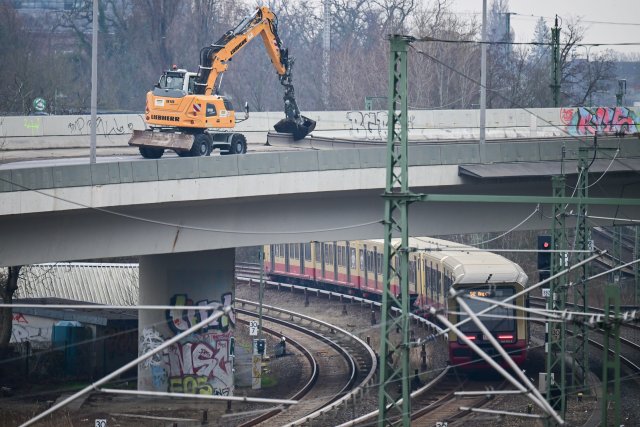- Kommentare
- Neukölln
Estrel Tower: Berlin's tallest building is laughing at you
The new hotel in Neukölln is a reminder that Berlin could build new housing – but investors prefer useless towers
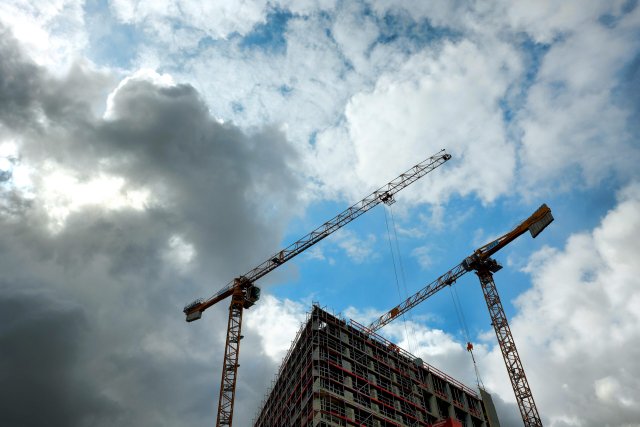
The building frame is slowly rising above Neukölln, as ominous as Barad-dûr with the Eye of Sauron from the movies »Lord of the rings«. When it's completed next year, the Estrel Tower will be Berlin's tallest building, with 45 stories. It's already impossible to miss, looming over every street.
This tower is an expansion of the Estrel Hotel right across the street. Germany's biggest hotel opened in 1995, and strangely, it's in the middle of an industrial area next to the Neukölln Ship Canal. The convention center is squeezed between a scrap metal yard and a factory for store-brand Nutella imitators. This is one of Berlin's poorest neighborhoods: the White Settlement, a housing project next to the Estrel, has been systematically run down by private investors.

Red Flag is a column on Berlin politics by Nathaniel Flakin. It appeared in Exberliner magazine from 2020 to 2023 and found a new home at the Berlin newspaper nd – as their first content in English. If you like a regular dose of very local communist content, please share. Nathaniel is also the author of the anticapitalist guide book Revolutionary Berlin.
Die Kolumne auf Deutsch lesen.
Right next to the hotel, the inner-city Autobahn A100 is cutting a deep path through the city. I always wondered: Why would someone who could afford a fancy hotel want to look down at the highway and the nougat creme plant? I found an article from ten years ago in »nd«, and Berlin's ultra-racist former district mayor Heinz Buschkowsky thought this was a feature: you can basically drive your car right into the lobby! Plenty of German philistines want to hold a convention in Berlin – but without encountering any scary Berliners. Here, they can go from the parking garage to their hotel room without setting foot outside.
As Berlin's housing crisis reaches ever-new heights, with the average student paying €640 for a room, the city has essentially given up on building apartments. The biggest landlord, Vonovia, has declared they have stopped all construction – it's just too expensive, they say. Yet everywhere we see cranes for hotels and offices. Couldn't people live in the Estrel Tower?
This is what makes the project so odious: As young people move from one six-month sublet to another, the bourgeoisie is erecting a monument to their own colossal indifference. »We know you need housing«, they yell at us from their tower, »but we don't care«. Instead of construction, capital is now flowing into speculation with existing buildings, driving up prices and rents even more.
This is the context in which René Benko's realty empire has collapsed. The Austrian billionaire has properties throughout this city – most famously the luxury department store KaDeWe. Rather, Benko had properties, as his Signa Group has entered bankruptcy. This is great news for Berliners: Neukölln will at least be spared a different useless tower, the reboot of the Karstadt palace at Hermannplatz.
As journalists sift through the ruins, we are learning how Benko went from a high-school dropout to one of the world's top realty speculators, even snatching up the Chrysler Building. Benko's skill set consisted in gaining billionaires' confidence, making corrupt deals with right-wing politicians, and falsifying financial records. In the last few years, he got at least €700 million from German taxpayers. This money was supposed to »save jobs« at department stores – but it only ended up propping up a house of cards. Perhaps the money could have been sent directly to the workers, rather than to their exploiters.
I'm sure there are realty developers who are not sociopathic gamblers, mafia dons, and corrupt operators – I'm just not sure who they are. As Donald Trump goes on trial in the United States, his defenders remind us that his financial tricks are »used by every real estate developer everywhere on earth«, and »this has never been prosecuted«, in the words of the Canadian investor Kevin O'Leary. And that's true. Yet if any of us used similar tactics to get a bank loan, we could expect to be thrown in prison. We just accept a certain amount of criminal behavior from the real estate sector.
If we want speculators to solve Berlin's housing crisis, we'll only get more useless towers. The only way to provide housing is to put it under public, democratic control. In a sense, this is our fault. This city's rulers are clearly not worried about barricades going up. In fact, they feel so confident that they put up the Estrel Tower to mock us.
Das »nd« bleibt. Dank Ihnen.
Die nd.Genossenschaft gehört unseren Leser*innen und Autor*innen. Mit der Genossenschaft garantieren wir die Unabhängigkeit unserer Redaktion und versuchen, allen unsere Texte zugänglich zu machen – auch wenn sie kein Geld haben, unsere Arbeit mitzufinanzieren.
Wir haben aus Überzeugung keine harte Paywall auf der Website. Das heißt aber auch, dass wir alle, die einen Beitrag leisten können, immer wieder darum bitten müssen, unseren Journalismus von links mitzufinanzieren. Das kostet Nerven, und zwar nicht nur unseren Leser*innen, auch unseren Autor*innen wird das ab und zu zu viel.
Dennoch: Nur zusammen können wir linke Standpunkte verteidigen!
Mit Ihrer Unterstützung können wir weiterhin:
→ Unabhängige und kritische Berichterstattung bieten.
→ Themen abdecken, die anderswo übersehen werden.
→ Eine Plattform für vielfältige und marginalisierte Stimmen schaffen.
→ Gegen Falschinformationen und Hassrede anschreiben.
→ Gesellschaftliche Debatten von links begleiten und vertiefen.
Seien Sie ein Teil der solidarischen Finanzierung und unterstützen Sie das »nd« mit einem Beitrag Ihrer Wahl. Gemeinsam können wir eine Medienlandschaft schaffen, die unabhängig, kritisch und zugänglich für alle ist.
